NEET Exam > NEET Notes > Chemistry Class 11 > How to Study Organic Chemistry for NEET
How to Study Organic Chemistry for NEET | Chemistry Class 11 PDF Download
Organic Chemistry is an important part of the NEET syllabus. To do well, you need to understand the concepts clearly, remember key reactions, and practice solving problems. With the right plan, it can become one of your strongest subjects. This guide covers practical strategies that match the NEET syllabus to help you prepare better for both NEET Main and Advanced.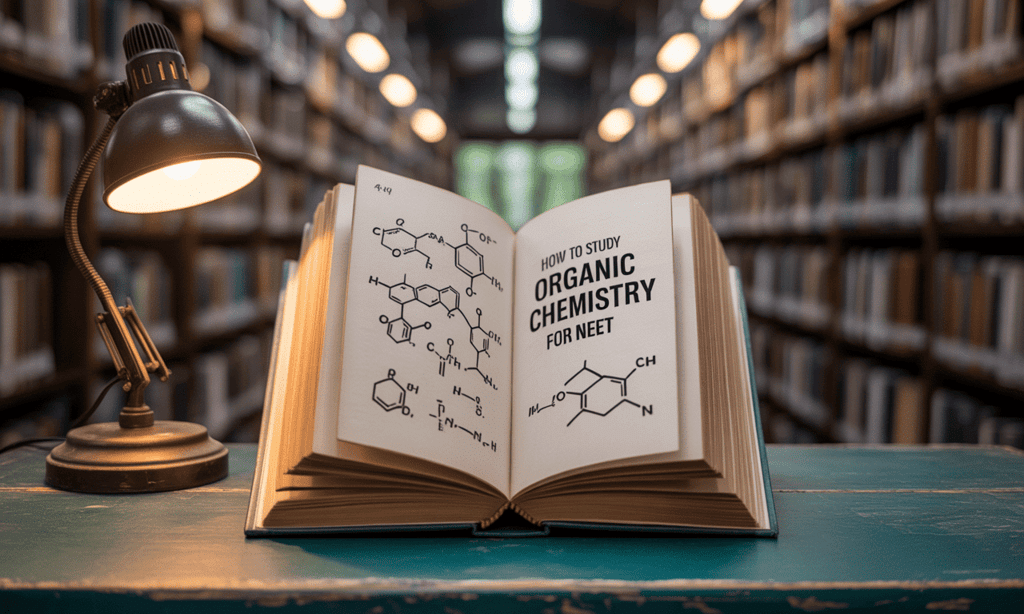
Understanding the NEET Organic Chemistry Syllabus
The NEET Organic Chemistry syllabus includes topics from both NEET Main and NEET Advanced. Below is a concise overview based on the standard syllabus:
- Some Basic Concepts Of Chemistry: Nomenclature, isomerism (structural, stereoisomerism), hybridization, resonance, hyperconjugation, inductive effect, electromeric effect, and mesomeric effect.
- Hydrocarbons: Alkanes, alkenes, alkynes, aromatic hydrocarbons (benzene), and their reactions (addition, substitution, elimination).
- Haloalkanes and Haloarenes: Nucleophilic substitution, elimination reactions, and their applications.
- Alcohols, Phenols, and Ethers: Preparation, properties, and reactions.
- Aldehydes, Ketones, and Carboxylic Acids: Preparation, properties, nucleophilic addition, and oxidation-reduction reactions.
- Organic Compounds Containing Nitrogen: Amines, diazonium salts, and their reactions.
- Biomolecules: Carbohydrates, proteins, nucleic acids, and vitamins.
- Polymers: Classification, preparation, and properties of common polymers.
- Chemistry in Everyday Life: Drugs, chemicals in food, and cleansing agents.
Here are some effective strategies to boost your preparation and performance!
Create a Structured Study Plan
- Syllabus Division: Break the syllabus into manageable sections with time allocation based on weightage:
- High Weightage (30–35%): Oxygen and nitrogen-containing compounds (alcohols, aldehydes, amines).
- Moderate Weightage (15–20%): Hydrocarbons, haloalkanes, haloarenes.
- Low Weightage (10–15%): Biomolecules, polymers, chemistry in everyday life.
- Daily Routine: Dedicate 1–2 hours daily to Organic Chemistry. Revise one topic, solve 20–30 problems, and note mistakes.
- Weekly Revision: Review reaction mechanisms and summaries weekly to reinforce retention.
- Study Plan for NEET: Access the expert-designed NEET study plan by EduRev, tailored to help you cover every topic efficiently and stay ahead in your preparation.
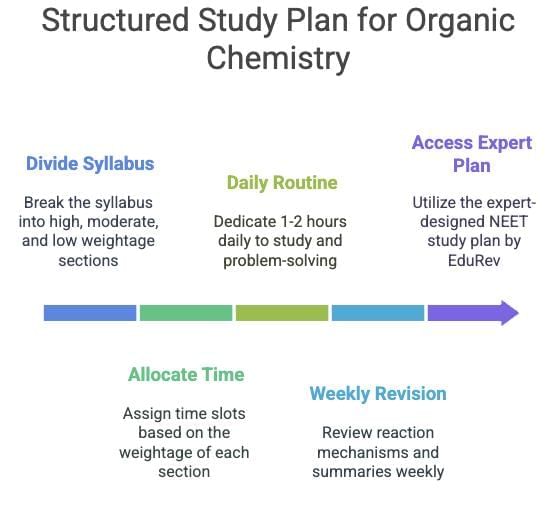
Build a Strong Foundation
- Focus Areas: Start with General Organic Chemistry (GOC), covering resonance, inductive effects, and hyperconjugation, as these are critical for understanding reaction mechanisms.
- Nomenclature and Isomerism: Master IUPAC naming and isomer identification (geometrical, optical, structural) for clarity.
- Resources: Use NCERT Class 11 and 12 textbooks to build a strong base, as NEET frequently tests NCERT-based concepts.
Master Reaction Mechanisms
- Understand, Don’t Memorize: Learn the “why” behind reactions (e.g., SN1/SN2, electrophilic addition, aldol condensation) to predict products for unfamiliar reactions.
- Key Reactions: Prioritize high-yield reactions like nucleophilic substitution (SN1/SN2), elimination (E1/E2), and electrophilic aromatic substitution. Create flowcharts mapping reagents, conditions, and products.
- Practice: Solve mechanism-based problems from Advanced Problems in Organic Chemistry by MS Chauhan.
Utilise Quality Study Materials
- NCERT Textbooks: Use Class 11 and 12 NCERT books for a strong conceptual base, as NEET often tests NCERT-based questions.
- Recommended Books:
- Organic Chemistry by Morrison & Boyd: For in-depth conceptual understanding.
- Advanced Problems in Organic Chemistry by MS Chauhan: For NEET Advanced-level practice.
- Organic Chemistry by Solomon & Fryhle: For clarity on complex topics.
Use Memorisation Techniques
- Mnemonics and Charts: Use mnemonics for reaction sequences (e.g., functional group priority: Carboxylic > Aldehyde > Ketone > Alcohol > Amine). Create wall charts for quick revision of reagents and named reactions.
- Flashcards: Make flashcards for reagents, catalysts, and named reactions (e.g., Clemmensen reduction, Cannizzaro reaction).
- Mindmaps for Chemistry: Make or access short, crisp mindmap for every chapter—especially reactions, concepts, and exceptions.
- Tips and tricks for NEET: Learn shortcut techniques, elimination tricks, and time-saving methods for Physics calculations, tricky Chemistry questions, and Math problem-solving. EduRev’s curated tips help you avoid silly mistakes and improve accuracy under pressure.
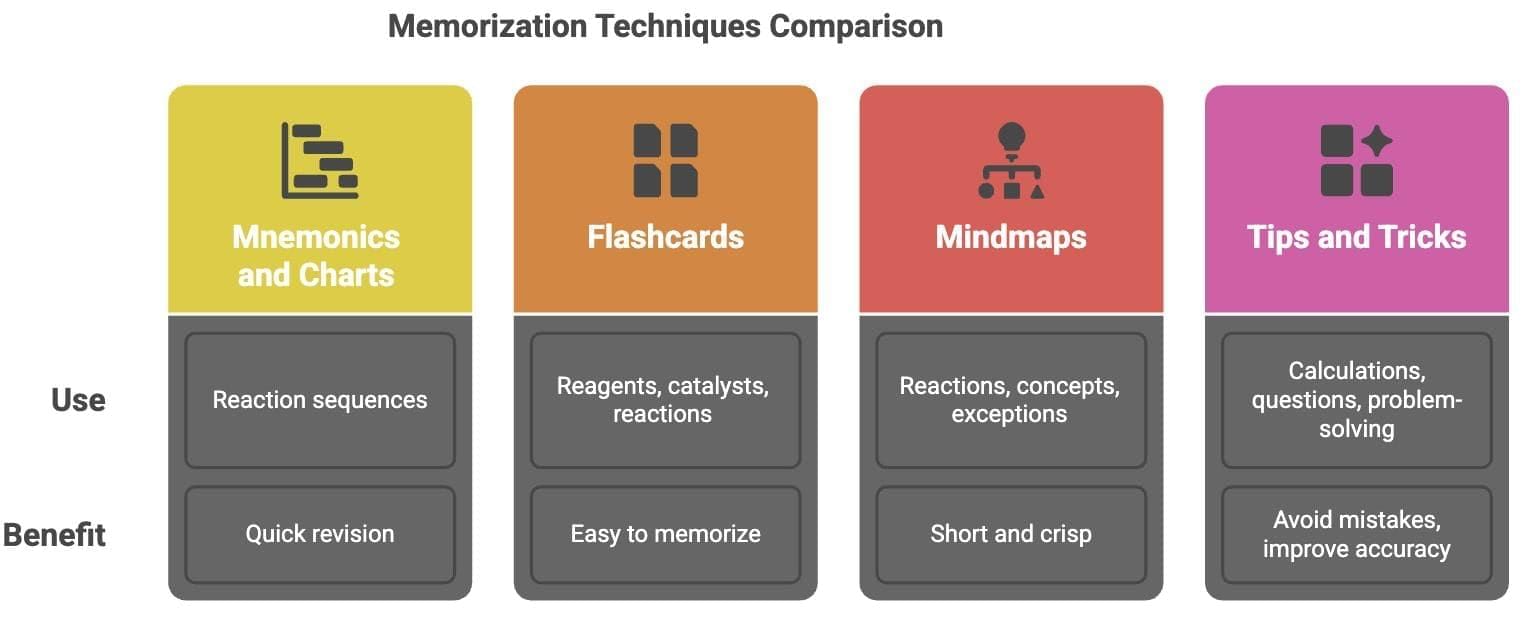
Master Practical Organic Chemistry
- Qualitative Analysis: Learn tests for functional groups (e.g., Tollens’ test for aldehydes, Fehling’s test for reducing sugars).
- Purification Techniques: Memorize methods like distillation, crystallisation, and chromatography.
- Practice: Solve lab-based questions, as they occasionally appear in NEET.
Prioritize Practice
- DPPs: Incorporating daily practice papers into your preparation is a powerful strategy to build confidence, enhance problem-solving skills, and solidify conceptual understanding.
- Past Years’ Papers: Analyze NEET papers from the last 10 years to identify patterns. Expect questions from Inorganic Chemistry to help you prepare.
- Mock Tests: Take timed mock tests to enhance recall under pressure.
- Error Analysis: Maintain a notebook to categorize errors (factual, application, or oversight) and revisit them regularly.
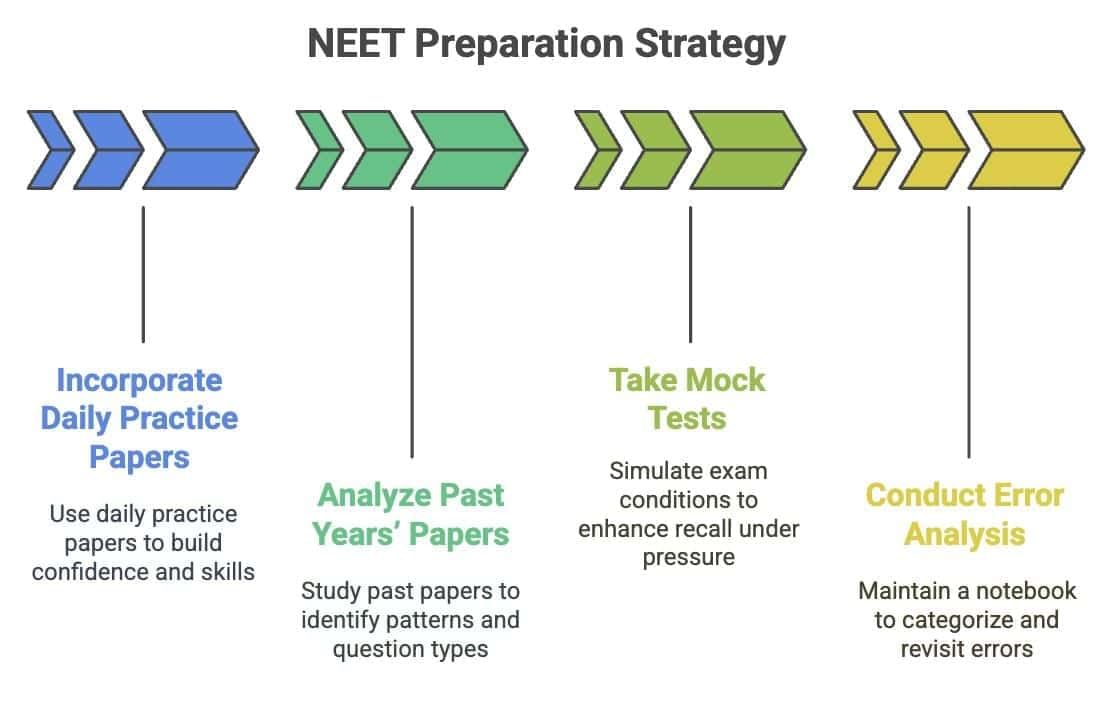
Solve Previous Years’ Papers
- Purpose: Analyse NEET Main and Advanced papers from the last 10 years to identify question patterns.
- Question Distribution: Expect 8–10 questions in NEET Main and 6–8 in NEET Advanced from Physical Chemistry.
- Approach: Categorise questions by topic and difficulty to prioritize practice.
Practice with Mock Tests
- Simulation: Take timed mock tests to replicate exam conditions.
- Focus: Improve time management and accuracy. Review mistakes to identify weak areas.
Exam Day Tips
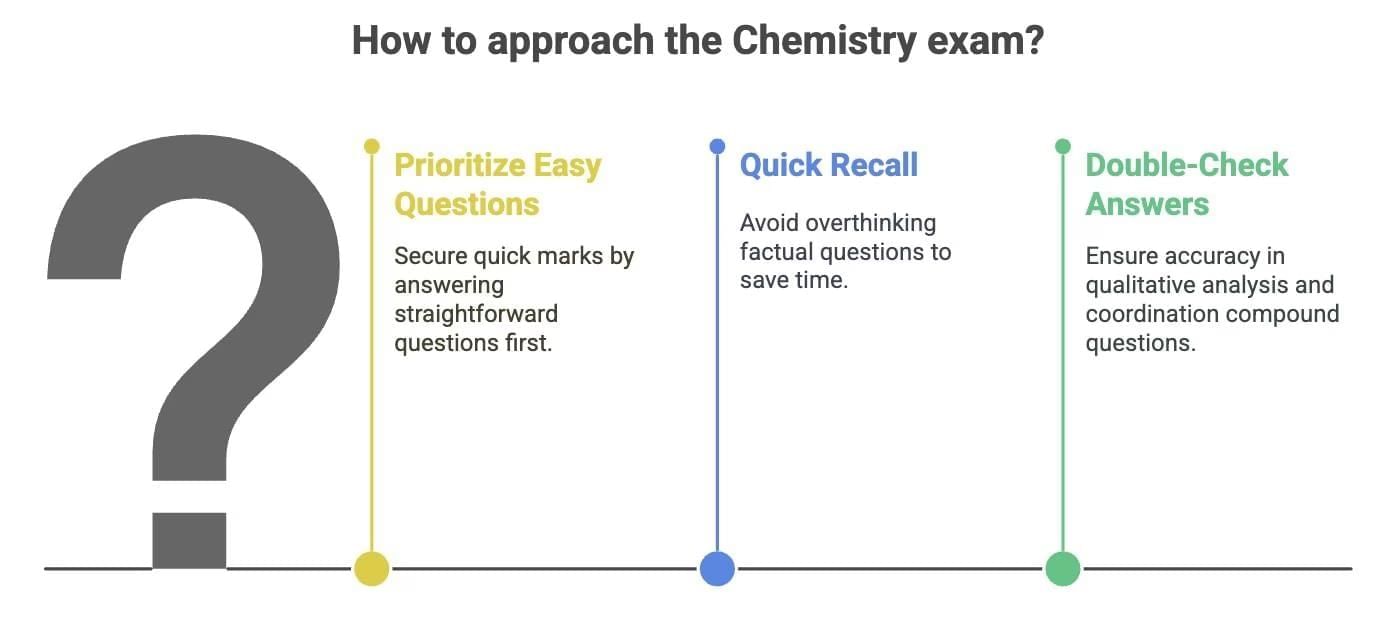
- Prioritize Easy Questions: Start with straightforward questions (e.g., nomenclature, functional group identification) to secure quick marks.
- Avoid Overthinking: If stuck on a reaction mechanism, move on and revisit later.
- Double-Check: Recheck answers for isomerism and reaction product questions to avoid errors.
Additional Tips for Success
- Consistency: Study Organic Chemistry daily to retain reactions and mechanisms.
- Health and Well-being: Maintain 6–8 hours of sleep, regular exercise, and a balanced diet to stay focused.
- Motivation: Set short-term goals (e.g., mastering alkenes in a week) and reward yourself to stay motivated.
The document How to Study Organic Chemistry for NEET | Chemistry Class 11 is a part of the NEET Course Chemistry Class 11.
All you need of NEET at this link: NEET
|
114 videos|263 docs|74 tests
|
FAQs on How to Study Organic Chemistry for NEET - Chemistry Class 11
| 1. What are the key topics covered in the JEE Organic Chemistry syllabus? |  |
Ans. The JEE Organic Chemistry syllabus primarily includes topics such as basic concepts of organic chemistry, structure and bonding, isomerism, reaction mechanisms, nomenclature, functional groups, and organic synthesis. It also emphasizes understanding reaction types, including substitution, elimination, and addition reactions, as well as the reactivity of different organic compounds.
| 2. How can I build a strong foundation in Organic Chemistry for competitive exams? |  |
Ans. To build a strong foundation in Organic Chemistry, start by thoroughly understanding the fundamental concepts and definitions. Focus on mastering nomenclature, functional groups, and basic reaction mechanisms. Utilize quality textbooks and online resources, along with visual aids such as molecular models. Regularly review and revise these concepts to reinforce your understanding.
| 3. What are effective memorization techniques for Organic Chemistry? |  |
Ans. Effective memorization techniques for Organic Chemistry include creating flashcards for reactions, mechanisms, and functional groups. Mnemonics can assist in remembering complex sequences and names. Additionally, visual aids such as charts and diagrams can help in retaining information. Practicing active recall by testing yourself regularly can also enhance memory retention.
| 4. How important is practice in mastering Organic Chemistry concepts? |  |
Ans. Practice is crucial in mastering Organic Chemistry concepts. Regularly solving problems and practicing reaction mechanisms helps solidify your understanding. Working through past exam papers and taking mock tests allows you to familiarize yourself with the exam format and identify areas where you need improvement. Consistent practice builds confidence and enhances problem-solving skills.
| 5. What role does practical Organic Chemistry play in exam preparation? |  |
Ans. Practical Organic Chemistry is essential in exam preparation as it provides hands-on experience with reactions and techniques. Understanding the experimental aspects, such as synthesis and characterization of organic compounds, reinforces theoretical knowledge. Practical skills also enhance your ability to analyze and interpret data, which is beneficial for both exams and future studies in chemistry.
Related Searches





















